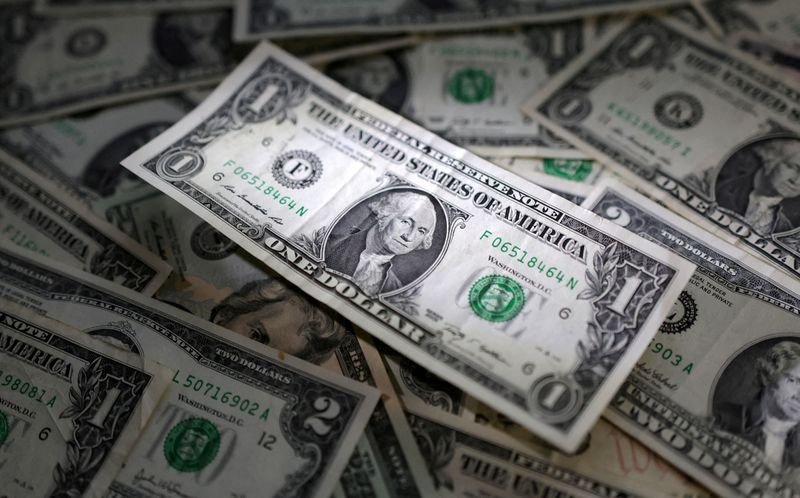By Gertrude Chavez-Dreyfuss
NEW YORK (Reuters) – The euro rose marginally against the U.S. dollar on Wednesday, but came off session highs, after a widely expected collapse of the French government following a no-confidence vote by opposition lawmakers.
The greenback, on the other hand, was little changed overall, as the December interest rate cut chances remained on track amid signs that the American economy was slowing.
The South Korean won, one of the biggest movers on Tuesday, rose against the dollar, bolstered by suspected central bank intervention and the finance ministry’s pledge of “unlimited” liquidity support to markets. That came a day after South Korean President Yoon Suk Yeol declared martial law in a late-night television address, only to lift it hours later.
The euro was slightly up against the dollar at $1.0512 after far-right and left-wing lawmakers joined forces to back a no-confidence motion against Prime Minister Michel Barnier and his government, with a majority 331 votes. Barnier is expected to tender his resignation and that of his government to President Emmanuel Macron shortly.
“At this point, it really becomes a question of how much worse the situation gets from here,” said Eugene Epstein, head of trading and structured products, North America, at Moneycorp in New Jersey.
“We don’t have any kind of clarity on what the outcome of the votes is going to be and how long essentially the budget is used as leverage to get all the parties’ political interest sorted.”
Three sources told Reuters that French President Emmanuel Macron aims to install a new prime minister quickly if his government falls on Wednesday.
Barnier’s removal would deepen the political crisis in the euro zone’s second-largest economy, and could further weigh on the euro.
Investors also digested comments from European Central Bank President Christine Lagarde in a parliamentary hearing on Wednesday. She said the ECB will continue to lower rates, but did not commit to any pace of easing.
The ECB will next meet on Dec. 12, and economists overwhelmingly expect another 25 basis-point (bp) rate cut, the fourth such move this year.
FED SEEN STILL CUTTING RATES IN DECEMBER
In the United States, the was flat at 106.33. Wednesday’s data did not shake expectations of an interest rate cut later this month.
U.S. private payrolls increased at a moderate pace in November, but it came below expectations, while annual wages for workers staying in their jobs edged up for the first time in 25 months.
Private payrolls rose by 146,000 jobs last month after advancing by a downwardly revised 184,000 in October, the ADP report showed. Economists polled by Reuters had forecast private employment increasing by 150,000 after a previously reported 233,000 jump in October.
At the same time, the U.S. services sector activity slowed in November after posting big gains in recent months. The Institute for Supply Management’s non-manufacturing purchasing managers index slipped to 52.1 last month after surging to 56.0 in October, the highest since August 2022. Economists polled by Reuters had forecast the services PMI easing to 55.5.
U.S. fed funds futures raised the chances of a 25-bp cut this month to 78%, from 73% late Tuesday, while reducing the odds of a pause in easing to 22% from 27% the day before, according to the CME’s FedWatch.
“It’s possible the Fed cuts again in December, which can put tactical pressure on the dollar because the market is long dollars already,” said Vassili Serebriakov, FX strategist at UBS in New York. “But unless U.S. data really deteriorates, which we don’t see at the moment, any weakness in the dollar is going to be short-lived.”
The dollar edged higher after St. Louis Federal Reserve President Alberto Musalem said on Wednesday he expects the Fed to continue cutting rates, but said it is keeping options open on the Dec. 17-18 meeting. Musalem will be a voter on the Federal Open Market Committee next year.
Fed Chair Jerome Powell later on Wednesday seemed to signal his support for a slower pace of interest-rate cuts ahead, noting the economy is stronger now than the central bank had expected in September when it began easing.
In South Korea, the won rallied on Wednesday after plunging overnight in the wake of President’s declaration of martial law, which was reversed hours later.
The dollar was last down 0.8% at 1,413.6 won, after jumping overnight. But politics remained in focus and South Korean lawmakers on Wednesday submitted a bill to impeach President Yoon.
Dealers said the Bank of Korea may have supported the won at Wednesday’s open by selling dollars.
The dollar also climbed against the yen, rising 0.6% to 150.52, after media reports raised doubts about market expectations the Bank of Japan would hike interest rates this month sent government bond yields lower.
Currency
bid
prices
at 4
December
09:10
p.m. GMT
Descript RIC Last U.S. Pct YTD High Low
ion Close Chang Pct Bid Bid
Previous e
Session
Dollar 106.3 106.32 -0.01 4.86% 106.72 106
index % .09
Euro/Dol 1.0515 1.0509 0.05% -4.75% $1.054 $1.
lar 4 047
2
Dollar/Y 150.52 149.26 0.83% 6.71% 151.22 149
en .58
Euro/Yen 157.90 157.18 0.7% 1.7% 158.65 156
.99
Dollar/S 0.8842 0.8862 -0.23 5.06% 0.8879 0.8
wiss % 82
Sterling 1.2702 1.2673 0.24% -0.17% $1.272 $1.
/Dollar 2 263
Dollar/C 1.4064 1.407 -0.04 6.1% 1.4083 1.4
anadian % 052
Aussie/D 0.6439 0.6487 -0.72 -5.54% $0.648 $0.
ollar % 8 639
9
Euro/Swi 0.9295 0.9314 -0.2% 0.1% 0.9327 0.9
ss 292
Euro/Ste 0.8275 0.829 -0.18 -4.53% 0.8301 0.8
rling % 27
NZ 0.5859 0.5882 -0.37 -7.26% $0.588 0.5
Dollar/D % 3 83
ollar
Dollar/N 11.0481 11.0478 0% 9.01% 11.097 11.
orway 5 017
4
Euro/Nor 11.6142 11.6262 -0.1% 3.52% 11.644 11.
way 601
Dollar/S 10.9175 11.0039 -0.79 8.45% 11.040 10.
weden % 9 904
Euro/Swe 11.4821 11.5695 -0.76 3.21% 11.586 11.

den % 5 481
1
